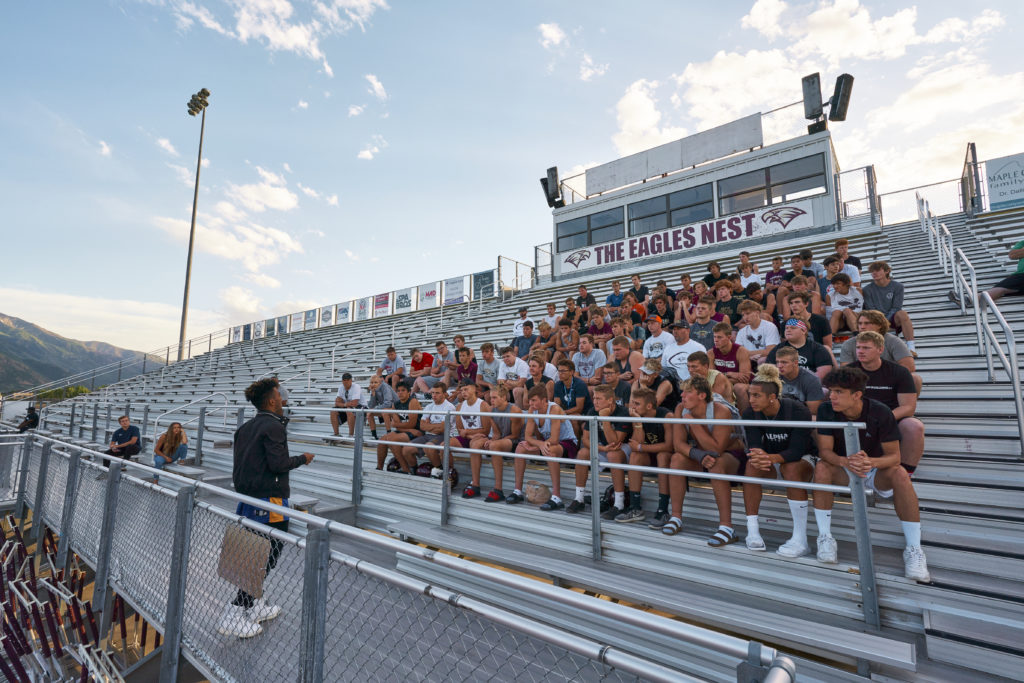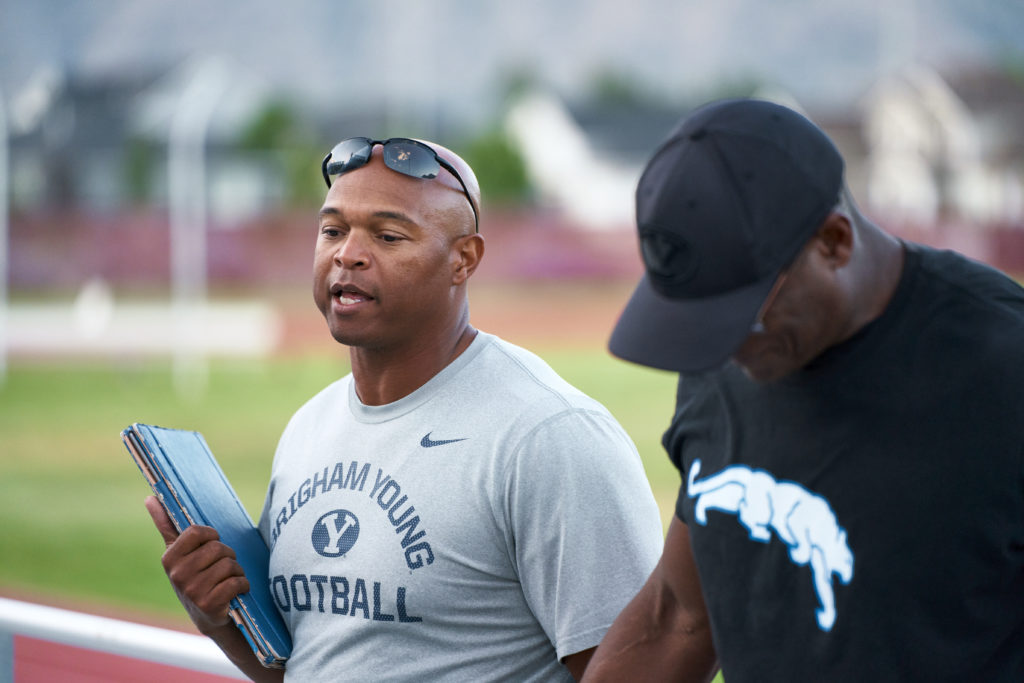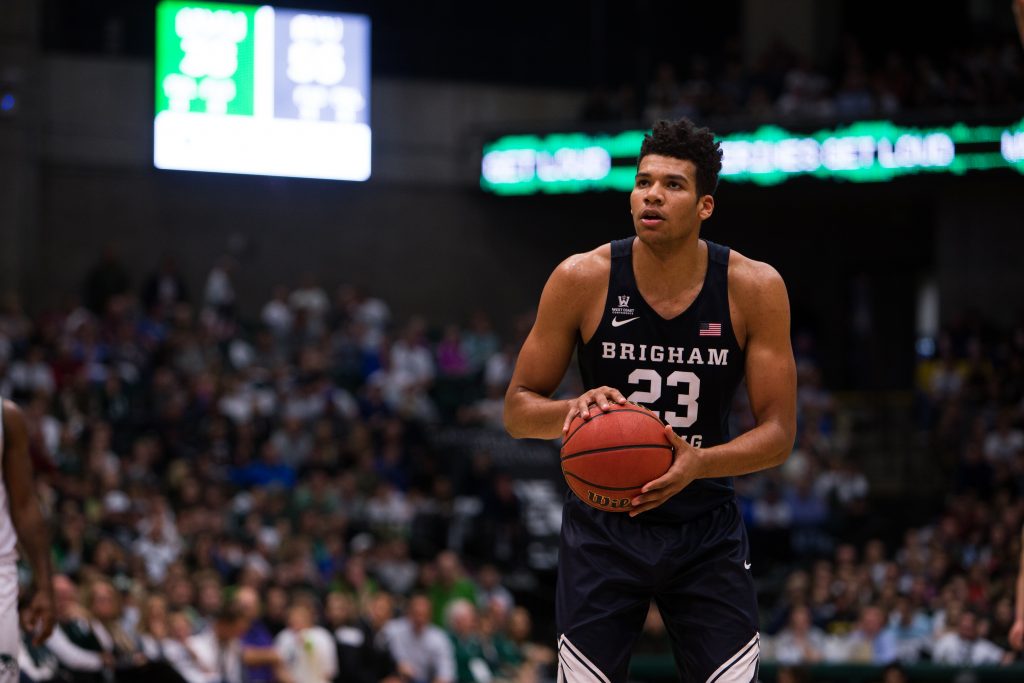Former BYU athletes add their voices to the Black Lives Matter movement
By Josh Carter and Caleb Turner
Leer en español: Ex-atletas de BYU agregan sus voces al movimiento de ‘Black Lives Matter’
Jamal Willis, Kalin Hall, Batchlor Johnson and Yoeli Childs are among the most recent former BYU athletes to add their voices to the Black Lives Matter movement.
BYU Football alumni Willis, Hall and Johnson each took turns speaking to the Maple Mountain High School football team on June 16 about recognizing and overcoming racism in today’s society.
Johnson, a current mass communications graduate student at BYU, spoke first, encouraging the team to not be afraid to ask uncomfortable questions to become more informed about the current racial climate.
“I know a lot of you may feel uncomfortable to ask questions or share your views,” Johnson said. “No matter what your thoughts or feelings might be, I want you to be able to speak up and be open. The most important thing is to have these conversations.”

Johnson urged the high school players to be proactive in their efforts to realize the significance of recent nationwide protests against police brutality and racism.
“There’s a lot going on right now and you guys have the responsibility to learn about it on your own,” Johnson said. “I can give you guys this dramatic speech and get all emotionally involved but at the end of the day it’s up to you guys.”
Former BYU and NFL running back Jamal Willis addressed the team next, drawing from personal experiences to highlight the struggles he faced as an African American growing up in the ’80s and ’90s. Willis, who held scholarship offers from a wide variety of top-tier football programs by the time he graduated high school, admitted he was skeptical about coming to Provo because of how few African Americans attended BYU.
“People in my community told me, ‘How dare you accept a scholarship to BYU, with all those white people up there. They’re not going to accept you,'” Willis said.
Willis’ father, however, said he had a “good feeling” about BYU and eventually convinced Willis to commit to the Cougars. Despite his initial skepticism, Willis recounted several instances where the people he came to know in Provo went out of their way to help him feel loved and accepted.

One such instance came during Willis’ freshman year on the first day of his Book of Mormon class. Willis sat in the back of the room, feeling alone and out of place. Just as the class was about to start, former BYU Football coach LaVell Edwards’ wife, Patti Covey Edwards, stood up from her seat at the front of the room, found Willis and exclaimed in front of the class, “Jamal! I’ve got a seat for you up here!”
“She stayed with me in that class throughout the entire semester,” Willis said. “She already had her degree. The only reason she stayed was because she cared about me.”
Willis invited the players to look back on similar instances in their own lives and help others feel that same type of love.
“What I want to tell you now is don’t change who you are. Don’t treat people any differently, just love them even more,” Willis said. “Understanding different cultures is obviously very important, but what it really comes down to is having that real, genuine love.”

Willis’ former BYU Football teammate Kalin Hall, father of current Cougar quarterback Jaren Hall, concluded the event with a few thoughts of his own. Echoing Willis’ comments, Hall said he believes the solution to overcoming racial injustices in today’s society is to develop love for one another.
“Just think about how would you want others to treat you,” Hall said. “It’s as simple as that. You’ve got to love everybody.”
Yoeli Childs shares thoughts on Instagram
BYU Basketball star forward Yoeli Childs, who concluded his Cougar career in March, shared his thoughts and experiences in an Instagram post on June 16, including stories of encounters he and his younger brother had with police while growing up in Utah.
“Growing up in Utah, I first realized that people looked at me differently from a young age. Everywhere I would go people would stare at me and my younger brother,” Childs said.
He went on to recount detailed stories from his adolescence, beginning at the age of 11, when a woman scrambled to lock her car as he passed her in a grocery store parking lot. He was also followed in a store and accused of stealing and was pulled over and questioned by police while at BYU because the officer did not believe the car belonged to Childs.
His brother, Masay Childs, had a much more dramatic encounter with the police when he was handcuffed and questioned at gunpoint by multiple officers because his car “fit a description.”
“These are experiences that almost all Black people face across the country,” Childs said. “Everyone knows that all lives matter, but not everyone knows that Black lives matter. Black lives have been treated as lesser for the entire history of our country. We are seen as threats and criminals because of the traditions passed down through generations.”

Childs mentioned the existence of systemic racism, both “visible” and “invisible,” specifically in American law enforcement and criminal justice. He pointed to police brutality and killings as principal reasons people across the country are “angry, sad, hurt and desperate for change.” He cited a quote from Martin Luther King Jr. that says, “riots are the language of the unheard,” and explained how protests, in their many forms, can lead to meaningful change.
“I don’t want to see violence, and no, I don’t advocate for destruction,” Childs said. “But the message that Black lives matter, and that change is necessary, needs to be heard.”
Childs finished his statement echoing many of the same ideas from Johnson, Willis and Hall, urging others to listen, educate themselves, and have empathy and a willingness to change.
“There is no shame in not knowing things or not knowing what to do,” Childs said. “The problem comes when you start to learn there is an issue and choose to be blind to it.”

